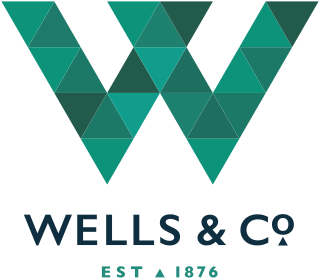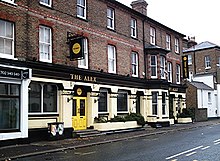
Foster's Lager is an internationally distributed brand of Australian lager. It is owned by the Japanese brewing group Asahi Group Holdings, and is brewed under licence in a number of countries, including its biggest market, the UK, where the European rights to the brand are owned by Heineken International.

Heineken N.V. is a Dutch multinational brewing company, founded in 1864 by Gerard Adriaan Heineken in Amsterdam. As of 2019, Heineken owns over 165 breweries in more than 70 countries. It produces 348 international, regional, local and speciality beers and ciders and employs approximately 85,000 people.
Carlsberg Marston's Brewing Company is a British brewing company. It was formed when Marston's plc disposed of its brewing operations in 2020, selling the assets to a newly formed joint venture with the Carlsberg Group to create the Carlsberg Marston's Brewing Company (CMBC), in which Marston's plc holds a 40% share.

Craft beer is a beer that has been made by craft breweries, which typically produce smaller amounts of beer, than larger "macro" breweries, and are often independently owned. Such breweries are generally perceived and marketed as emphasising enthusiasm, new flavours, and varied brewing techniques.

Brains is a regional brewery based in Cardiff, Wales. It was founded in 1882 by Samuel Arthur Brain. At its peak, the company controlled more than 250 pubs in South Wales, Mid Wales and the West Country but the brewer sold most of its pub estate in 2022. The company took over Crown Buckley Brewery in Llanelli in 1997 and Hancock's Brewery in 1999. In 2000, Brains moved to the former Hancock's Brewery just south of Cardiff Central railway station. The Old Brewery, in Cardiff city centre, has been developed into a modern bar and restaurant complex.

Boddingtons Brewery was a regional brewery in Manchester, England, which owned pubs throughout the North West. Boddingtons was best known for Boddingtons Bitter (Boddies), a straw-golden, hoppy bitter which was one of the first beers to be packaged in cans containing a widget, giving it a creamy draught-style head.

Bass Brewery was founded in 1777 by William Bass in Burton-upon-Trent, Staffordshire, England. The main brand was Bass Pale Ale, once the highest-selling beer in the UK. By 1877, Bass had become the largest brewery in the world, with an annual output of one million barrels. Its pale ale was exported throughout the British Empire, and the company's red triangle became the UK's first registered trade mark.

In the United Kingdom, a tied house is a public house required to buy at least some of its beer from a particular brewery or pub company. That is in contrast to a free house, which is able to choose the beers it stocks freely.

The Pabst Brewing Company is an American company that dates its origins to a brewing company founded in 1844 by Jacob Best and was, by 1889, named after Frederick Pabst. It is currently a holding company which contracts the brewing of over two dozen brands of beer and malt liquor: these include its own flagship Pabst Blue Ribbon, as well as brands from many now-defunct breweries.
Whitbread is a British multinational hotel and restaurant company headquartered in Houghton Regis, England.

Beer has been brewed in England for thousands of years. As a beer brewing country, it is known for top fermented cask beer which finishes maturing in the cellar of the pub rather than at the brewery and is served with only natural carbonation.

Brewing in Ireland has a long history. Production currently stands at over 8 million hectolitres, and approximately half the alcohol consumed is beer.

Beer is the most popular alcoholic drink in New Zealand, accounting for 63% of available alcohol for sale. At around 64.7 litres per person per annum, New Zealand is ranked 27th in global beer consumption per capita. The vast majority of beer produced in New Zealand is a type of lager, either pale or amber in colour, and typically 4–5% alcohol by volume.

Wells & Co. is the holding company of the Charles Wells Brewery and Pub Company. Charles Wells Ltd was founded in 1876 by Charles Wells in Bedford, England.
Ei Group plc, formerly known as Enterprise Inns plc, was the largest pub company in the UK, with around 4,000 properties, predominantly run as leased and tenanted pubs. Ei Group plc was headquartered in Solihull, West Midlands. It was listed on the London Stock Exchange until it was acquired by Stonegate Pub Company in March 2020.

Worthington Brewery, also known as Worthington & Co. and Worthington's, is a British brewer founded by William Worthington in Burton upon Trent in 1761. It is the third oldest continuously brewed British beer brand, after Shepherde Neame and Whitbread. The best known Worthington beers are its Creamflow nitrokeg bitter and White Shield India Pale Ale.

The Supply of Beer Order 1989 and the Supply of Beer Order 1989, commonly known as the Beer Orders, were statutory instruments made by the United Kingdom Secretary of State for Trade and Industry in December 1989.

Stones Brewery was a brewery founded in 1868 by William Stones in Sheffield, West Riding of Yorkshire, England, and purchased by Bass Brewery in 1968. After its closure in 1999, its major brand, Stones Bitter, has continued to be produced by the Molson Coors Brewing Company.

Camerons Brewery is an English brewery established by John William Cameron in Stranton, Hartlepool, County Durham, in 1865. It is the largest independent brewer in the North East of England, with a brewery capacity of 1.5 million hectolitres and a tied estate of 75 houses. It is one of the oldest industrial concerns in Hartlepool, and has historically been one of the largest employers.

Phipps Northampton Brewery Company Ltd has a long and varied history of brewing real ale and stout. It is based in Northampton, England.
















